Editor's Note: One year after the National Security Law for Hong Kong was implemented, Hong Kong residents are once again enjoying a vibrant life in the metropolis, without fear of street violence and assaults that may come simply for speaking one's mind. With the institutional safeguards for national security in place, the special administrative region itself has also turned a new page, with stronger economic competitiveness and a safer societal environment.
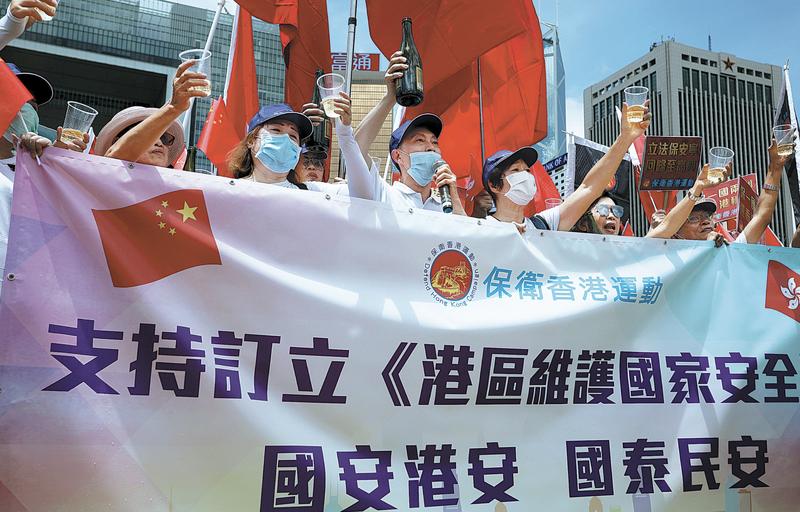 Hong Kong residents celebrate the enactment of the National Security Law for Hong Kong on June 30, 2020, in Tamar Park, Hong Kong. (CALVIN NG / CHINA DAILY)
Hong Kong residents celebrate the enactment of the National Security Law for Hong Kong on June 30, 2020, in Tamar Park, Hong Kong. (CALVIN NG / CHINA DAILY)
Life continues to improve for Kate Lee Hoi-wu, a 52-year-old cafe owner in Hong Kong who suffered a lot in the city's violence-defined 2019.
Her business has recovered and grown a lot. Even under the current COVID-19 pandemic, the shop has survived and is doing well. The small cafe had long been handled by Lee alone, but she has received increasing help from neighbors who are voluntarily lending a hand. In May last year, she opened a branch in a shopping mall in Shenzhen, Guangdong province.
All these cheering changes were unimaginable two years ago, when Lee was at the center of the months-long social campaign triggered by an extradition bill.
After denouncing protest violence at a pro-police rally in June 2019, Lee was harassed with vile complaints and hateful telephone calls. During the worst days, she spent the night on a makeshift folding bed at the shop because she lived in fear of thugs who were appearing near her home with long umbrellas and wooden sticks.
ALSO READ: Hong Kong’s National Security Law one year on
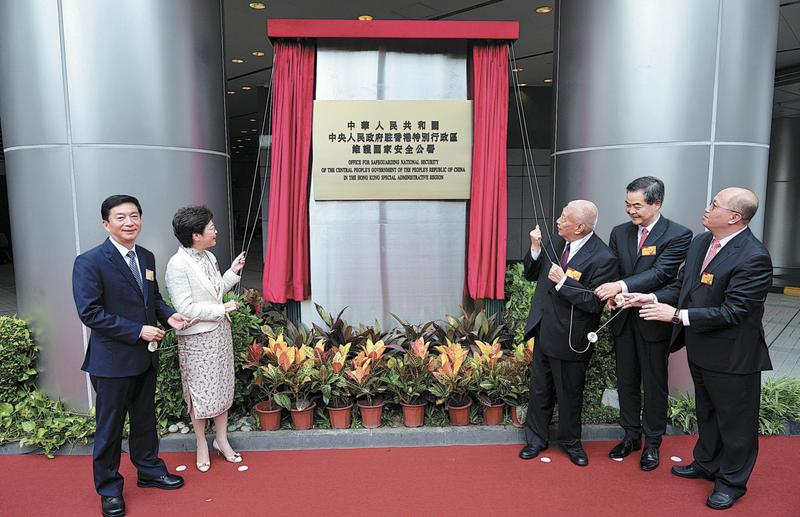 The Chief Executive, Carrie Lam Cheng Yuet-ngor (second left), unveils the plaque at the plaque unveiling ceremony of Office for Safeguarding National Security of the Central People's Government in the Hong Kong Special Administrative Region (HKSAR) on July 8, 2020, together with the Director of the Liaison Office of the Central People's Government in the HKSAR and the National Security Adviser to the Committee for Safeguarding National Security of the HKSAR, Luo Huining (first left); Vice-Chairmen of the National Committee of the Chinese People's Political Consultative Conference Tung Chee-hwa (third right) and Leung Chun-ying (second right); and head of the Office for Safeguarding National Security of the Central People's Government in the HKSAR, Zheng Yanxiong (first right). (PHOTO / CHINA DAILY)
The Chief Executive, Carrie Lam Cheng Yuet-ngor (second left), unveils the plaque at the plaque unveiling ceremony of Office for Safeguarding National Security of the Central People's Government in the Hong Kong Special Administrative Region (HKSAR) on July 8, 2020, together with the Director of the Liaison Office of the Central People's Government in the HKSAR and the National Security Adviser to the Committee for Safeguarding National Security of the HKSAR, Luo Huining (first left); Vice-Chairmen of the National Committee of the Chinese People's Political Consultative Conference Tung Chee-hwa (third right) and Leung Chun-ying (second right); and head of the Office for Safeguarding National Security of the Central People's Government in the HKSAR, Zheng Yanxiong (first right). (PHOTO / CHINA DAILY)
The entire city at the time was gripped by the deep fear incited by radical protesters. Violence and destruction had become the norm. Hate and lies had gained the upper hand. The city was rapidly falling and on the verge of collapse.
When Lee thought the city would be defeated and crash, central authorities devised the National Security Law for Hong Kong to enable the city to ride out the storm. The law, which categorized four types of serious national security offenses, was implemented on June 30, 2020.
This March, authorities also initiated improvements to the city's electoral system to ensure Hong Kong will have patriot-led administrations. Passed by Hong Kong's legislature on May 27, the revised system will be applied in future elections, affecting key components of the special administrative region's governing team, including the chief executive and legislators.
These measures have brought long-awaited peace and order to Hong Kong. On the first anniversary of the security law's implementation, the Security Bureau said 117 suspects had been arrested under the law, and over half of them had been prosecuted.
Activists who played a crucial role in the 2019 unrest, including media magnate Jimmy Lai Cheeying and student activists Joshua Wong Chi-fung and Agnes Chow Ting, were sentenced to prison for offenses related to the unrest. Lai got a 20-month sentence in May. Wong and Chow were sentenced in December to 13.5 months and 10 months, respectively.
The law also delivered a significant blow to street violence.
Citing the decreasing harassment against her after the National Security Law for Hong Kong was promulgated, Lee said it made her and other regular Hong Kong people feel secure, enabling residents to live and express views without fear.
According to a survey conducted in late June, 82.6 percent of the 1,509 interviewees said the city's public order has been improved since the law took effect, while 71.9 percent said the law boosted their confidence in the "one country, two systems" principle.
Among those arrested under the law were six people with ties to a local tabloid-the now-defunct Apple Daily. They, including five executive directors of the media group, were arrested in June on suspicion of conspiring to collude with foreign or external forces to endanger national security.
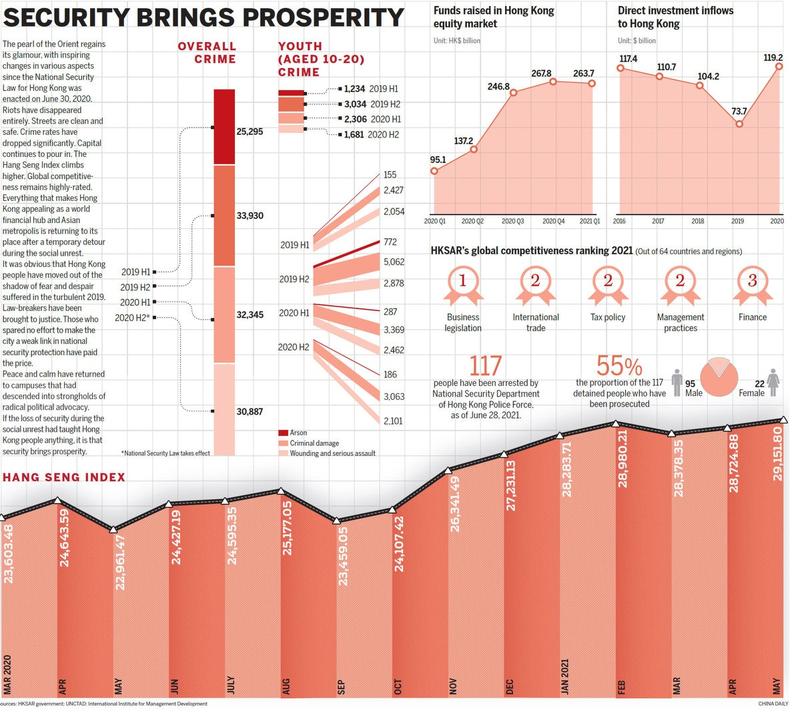
The police in June also froze the assets of three companies related to the tabloid, which had made relentless efforts to malign Hong Kong and the central government ever since Hong Kong returned to the motherland in 1997. The police said the tabloid had published dozens of reports calling for foreign sanctions against the city and China.
Cafe owner Kate Lee described the shutdown of Apple Daily as removing a "tumor" of society. She said that the "irresponsible" newspaper played a key role in inciting the public, especially youngsters, to stand against the government
Lee described the shutdown as removing a "tumor" of society. She said that the "irresponsible" newspaper played a key role in inciting the public, especially youngsters, to stand against the government. Thus, its closure is a collective wish of many Hong Kong people, she said.
Grenville Cross, former Hong Kong director of public prosecutions, said that there are always limits to press freedom, and journalistic activities endangering national security are intolerable throughout the civilized world.
Noting that the newspaper has been operated as a quasi-political entity, Cross attributed its failure to Lai's "political obsession" and "the machinations of his inner circle".
Mark Pinkstone, Hong Kong's former chief information officer, said that the arrest of Apple Daily-related suspects has nothing to do with infringing on press freedom, as claimed by certain local and foreign media, but is simply a case of police investigating criminal acts.
He said that there was virtually no international press coverage when Taiwan province raided Next Digital's Taipei office and confiscated its copies in 2002. Criticizing the foreign media's and politicians' hypocrisy and double standards, Pinkstone stressed that foreign media are not in any position to interfere in Hong Kong affairs.
Along with the positive changes in the social and political environment, the atmosphere in campuses is also shifting toward a healthier direction.
To improve the learning environment in schools, which had degenerated into hotbeds for radical advocacy during the protest movement, authorities in February issued detailed guidelines and a curriculum framework of national security education.
 Kate Lee Hoi-wu (right) joins customers for a photograph at her cafe in Lei Yue Mun, Hong Kong, on Oct 10, 2020. (PHOTO / XINHUA)
Kate Lee Hoi-wu (right) joins customers for a photograph at her cafe in Lei Yue Mun, Hong Kong, on Oct 10, 2020. (PHOTO / XINHUA)
Many schools also took the initiative to double their efforts in this area, launching various activities to improve students' awareness of national security. As part of the endeavor, hundreds of local students got the rare opportunity in late June to meet with the nation's leading scientists in the aerospace field, which is also a component of national security.
Back in 2019, some students in Hong Kong who are from the Chinese mainland had to quit school and move to Shenzhen to continue their studies because they feared being targeted on campus. Political leaflets were often distributed at schools in the city, and students were constantly radicalized to participate in the social unrest.
According to the police report of the 2019 law-and-order situation, among the 7,549 people arrested in connection with the social unrest, 40.9 percent of them were students. The police said the percentage of arrested students had significantly increased after the school year began in September, and more and more of those arrested were young.
Lawrence Tang Fei, principal of Hong Kong's Heung To Secondary School (Tseung Kwan O), said that with the National Security Law for Hong Kong in place, local schools are able to stay away from politics and refocus on education.
He said that the mass participation of students in 2019 protests was affected by a social trend, but now the trend has been reversed. If some teachers again attempt to instill radical advocacy among students, their efforts will be in vain, Tang said.
For 18-year-old student Poon Sze-ki, her life at Hon Wah College on Hong Kong Island is a good case in point. Poon, who came from the Chinese mainland, found herself in a much friendlier environment at school.
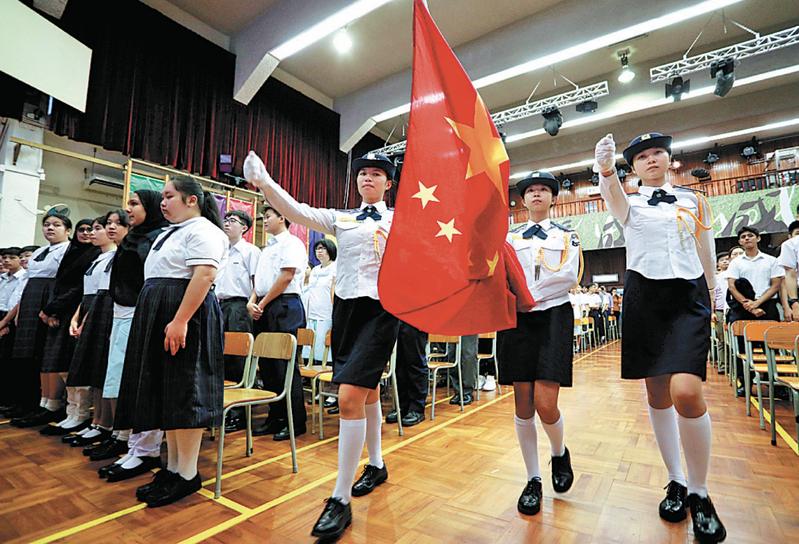 Students from HKFEW Wong Cho Bau Secondary School in Tung Chung in the New Territories mark the new semester on Sept 2, 2019, by singing the national anthem and taking part in a flag-raising ceremony. (CALVIN NG / CHINA DAILY)
Students from HKFEW Wong Cho Bau Secondary School in Tung Chung in the New Territories mark the new semester on Sept 2, 2019, by singing the national anthem and taking part in a flag-raising ceremony. (CALVIN NG / CHINA DAILY)
More and more of her peers at school opened themselves to things related to the Chinese mainland and embraced different views. Some also told Poon they were interested in the life on the mainland that she shared.
Reviewing the effect of the National Security Law for Hong Kong during the past year, Hong Kong Chief Executive Carrie Lam Cheng Yuet-ngor wrote in an article for Wen Wei Po on June 30 that the law marked "a major turning point" for the city. It has better protected not only the basic rights and freedoms of residents, but also made a historic move in improving the "one country, two systems", she wrote.
In the same report, the city's new chief secretary, John Lee Ka-chiu, wrote that the law has effectively guarded the city's public security and controlled the risks to national security.
READ MORE: HK sectors: Security law boosted 'one country, two systems’
The government will continue to firmly guard against national security risks and mobilize more local residents to join the collective effort, they pledged.
In the virus-plagued 2020, Lee listed the enactment of the National Security Law as the most unforgettable moment. She recalled that on the afternoon of June 30 last year, when the law was within hours of being enacted, many Hong Kong residents began to celebrate in social media groups.
"Only those who experienced the storm can share our joy. At that moment, my deepest feeling is: We finally got what we were yearning for."
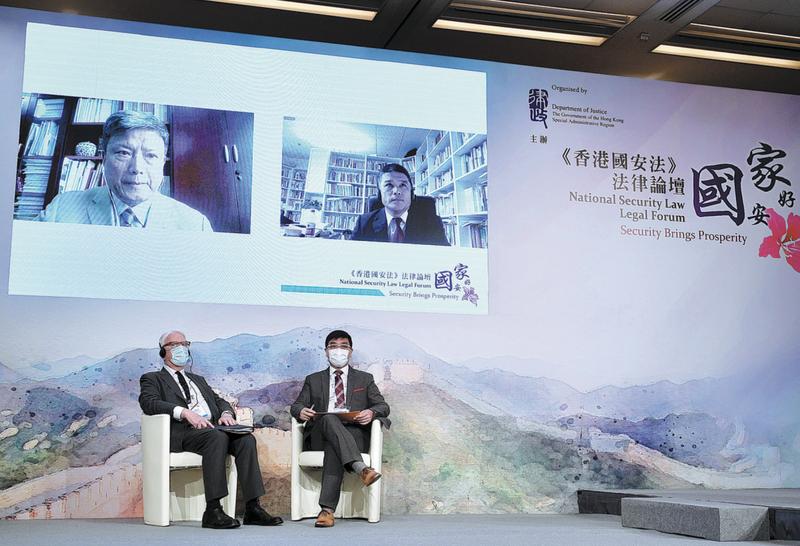 Officials and experts share their views at the National Security Law Legal Forum entitled "Security Brings Prosperity" on Monday in Hong Kong. The event aimed to enhance public understanding and awareness of the Law of the People's Republic of China on Safeguarding National Security in the Hong Kong Special Administrative Region. (PHOTO / CHINA DAILY)
Officials and experts share their views at the National Security Law Legal Forum entitled "Security Brings Prosperity" on Monday in Hong Kong. The event aimed to enhance public understanding and awareness of the Law of the People's Republic of China on Safeguarding National Security in the Hong Kong Special Administrative Region. (PHOTO / CHINA DAILY)


